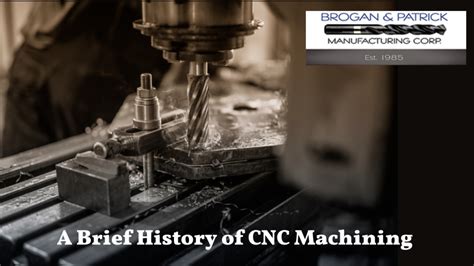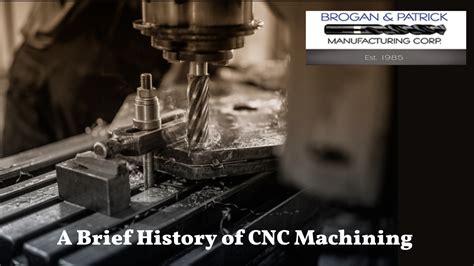how did the introduction of cnc change the manufacturing industry Today, CNC technology is an integral part of modern manufacturing, contributing to efficiency, accuracy, and automation. It has shaped the way products are designed, developed, and . Our list of recommendations covers the various materials used in the most popular bread boxes, including metal, plastic, bamboo, and other types of wood. Depending on shoppers’ kitchen.
0 · why cnc machining is important
1 · history of cnc manufacturing
2 · history of cnc machinery
3 · cnc machining impact on manufacturing
We provide custom manufacturing machining service to contractors, designers and shops in a wide variety of industries utilizing solid wood, panel products, aluminum panels, plastics, pvc, carbon fiber, and non-ferrous metals.

why cnc machining is important
In the 1960s and 1970s, the introduction of computers to control the machine tools was a game-changer. The advent of microprocessors and digital technologies in the 1980s further accelerated the development of CNC machines, making them more powerful, versatile, and easier to use.Today, CNC technology is an integral part of modern manufacturing, contributing to efficiency, accuracy, and automation. It has shaped the way products are designed, developed, and .Introduction: CNC (Computer Numerical Control) machines have revolutionized the manufacturing industry with their increased efficiency and accuracy. From the past to the present, CNC . The evolution of CNC machines is unique. Starting from a simple machine controlled with a punch card to a software-powered machine is enigmatic. Because of the .
The 1970s heralded the era of Computer Numerical Control (CNC), a groundbreaking leap in manufacturing technology. By replacing punched tape with computer . While the manufacturing industry tends to stay with tried-and-true technology, CNC machines have become one modern innovation embraced in many shops today. The advantages of computerized control make CNC .The evolution of CNC machining has had a profound impact on the manufacturing industry, transforming it from a labor-intensive and time-consuming process to one that is highly automated, efficient, and precise.
In 1952, the Massachusetts Institute of Technology (MIT) introduced the first CNC milling machine, which was programmed using punch cards. This marked the beginning of a .CNC machining’s roots can be traced back to the 1940s and 1950s when the first numerical control (NC) machines were developed. These machines used punched tape to direct the . CNC machines allow fast and agile manufacturing of parts for many industries like following: automotive industry – from drivetrain parts (engine blocks and heads or gearbox housings), through the manufacturing of the body . Almost every manufacturing industry uses Computer Numerical Control, or CNC, machines nowadays. From the production of car parts to the production of specific musical instruments, CNC machining is .
IntroductionThe fourth industrial revolution, or Industry 4.0, is reshaping manufacturing with advancements in automation, data exchange, and real-time processing. Key technologies like the Internet of Things (IoT), cloud .CNC machines:, What is the major difference between NC and CNC systems? and more. . Complex parts were needed in the aircraft industry. The coded set of instructions for machining a part is called: . Which statement about the demands of modern manufacturing is true? Modern manufacturing demands: The ability to quickly adapt to product . The importance of CNC in the manufacturing industry cannot be overstated. Manufacturers rely on CNC for high accuracy and productivity. CNC technology has evolved significantly since its inception. Early CNC systems were rudimentary compared to today's sophisticated machines. The historical context of CNC reveals a journey from manual control .
CNC machines have evolved from simple, punch-tape-controlled devices into almost fully automated apparatuses capable of working using numerous axes.For anyone who works with this equipment, the story of how CNC machining evolved tells how far the technology has progressed in just a short time. Examining any history is a way to better appreciate the .Introduction of CNC: The 1970s brought CNC technology, utilizing computers to automate machining, allowing for more complex geometries and faster production. Integration with CAD/CAM: In the 1980s and 1990s, Computer-Aided Design (CAD) and Computer-Aided Manufacturing (CAM) streamlined design and production processes.
Industrial revolution brought many changes in product manufacturing. One such change was the introduction of machines that could be controlled by a computer. This led to the development of CNC machining, or Computer Numeric Controlled machining. CNC machining allowed for the development of more complex parts faster and accurately than before.
Computer Numerical Control (CNC) machines are very popular in the manufacturing industry. In the past, many manufacturers used machines that were controlled by qualified engineers. Today, however, computers, making it possible for people with less training to operate the machines, control CNC machines.

THE CNC introduction. Thread starter bryce reynolds; Start date Feb 28, 2005; Replies 12 Views 1,588 B. bryce reynolds Plastic. Joined Feb 23, 2005. Feb 28, 2005 #1 When approximately did the CNC first get introduced into machining and when did it start to get more prevalently used? . Register for the world’s largest manufacturing .
Introduction: CNC (Computer Numerical Control) machines have revolutionized the manufacturing industry with their increased efficiency and accuracy. From the past to the present, CNC machines have undergone significant advancements, making them a crucial part of today’s manufacturing processes.In Conclusion, the rise of CNC machines has transformed the manufacturing landscape, empowering businesses to achieve levels of precision, efficiency, and flexibility that were once inconceivable. From the production of simple components to intricate assemblies, CNC machines have become the cornerstone of modern manufacturing operations. It just gives generic hand-waving phrases like "The introduction of lower-cost CNC machines radically changed the manufacturing industry." Yeah, no kidding. I knew that. I am trying to find out what specific machines were being sold in large numbers by the Japanese as CNC machines in the 1970s and early 1980s. Fanuc was more a robotics company.Industry 4.0 is more than just a buzzword; it is a transformative force that is reshaping the manufacturing landscape, including CNC manufacturing. The promise of enhanced automation, increased connectivity, intelligent data analysis, predictive maintenance, and adaptive manufacturing make Industry 4.0 a potent driver of change.
Today, CNC technology is an integral part of modern manufacturing, contributing to efficiency, accuracy, and automation. It has shaped the way products are designed, developed, and produced, revolutionizing industries ranging from aerospace and automotive to electronics and medical devices.
history of cnc manufacturing
Since the first introduction of CNC machining, multiple industries and applications have radically changed. Even today, we see shifts as CNC machinery becomes more advanced and tackles new challenges. To say that . Key elements of Industry 4.0. Image used courtesy of PD Solutions . Industry 4.0 promises to reign in a new era in manufacturing, with new technologies such as augmented reality, virtual reality, fully autonomous .
In response to the ever-growing concern for sustainability, the CNC machining industry is an emerging concern, and hence the CNC machining industry has adapted to it. Energy-efficient machines and working with environmentally friendly materials and coolants are the future of CNC machining. 5. IoT and Industry 4.0 The evolution of CNC (Computer Numerical Control) machining within the UK manufacturing industry has been a pivotal force in shaping the modern landscape of production and innovation. This exploration delves into the chronological progression from the traditional methods of manual machining to the widespread integration of CNC technology.How did the Second Industrial revolution change the economy in the United States after the Civil War? . What did the method of manufacturing known as the American system rely upon? . a. the division of labor b. the use of the production line c. the making of interchangeable parts. c. Which industry experienced the greatest growth in the . Introduction to CNC Machining and its Role in the Manufacturing Industry. CNC machining, or Computer Numerical Control machining, is a manufacturing process where pre-programmed software dictates the movement of factory tools and machinery.
Sigma Technik Limited, as a prototype production company and rapid manufacturer focusing on rapid prototyping and low volume production of plastic and metal parts, has advanced manufacturing technology, one-stop service, diversified manufacturing methods, on-demand manufacturing services and efficient manufacturing processes, which can provide customers .The manufacturing industry was transformed with the introduction of computers, and the first CNC machine tools were born in the 1970s. These advanced machines, equipped with computer controls, can . 3. Introduction to CNC 3 Numerical control (NC) is the automation of machine tools that are operated by precisely programmed commands encoded on a storage medium, as opposed to controlled manually. Most NC today is computer numerical control (CNC), in which computers play an integral part of the control. In modern CNC systems, end-to-end component .
However, the introduction of CNC machines has revolutionized the industry, offering numerous advantages that accelerate the manufacturing process while maintaining superior quality. 1. Enhanced Precision:\ One of the most significant advantages of CNC machines in gun manufacturing is their exceptional precision. However, all of this has changed due to the introduction of Precision CNC Machining for CNC prototyping. Today, in large-scale industrial sectors all around the world, almost all of the traditional machining tools such as Lathes, Milling Machines, Grinders, etcetera use CNC technology in order to enhance their product quality. Introduction: Embracing Sustainability in CNC Manufacturing As 2024 unfolds, the world of Computer Numerical Control (CNC) manufacturing is experiencing significant changes. Now valued at over .

pld metal ammunition boxes price
$22.00
how did the introduction of cnc change the manufacturing industry|cnc machining impact on manufacturing